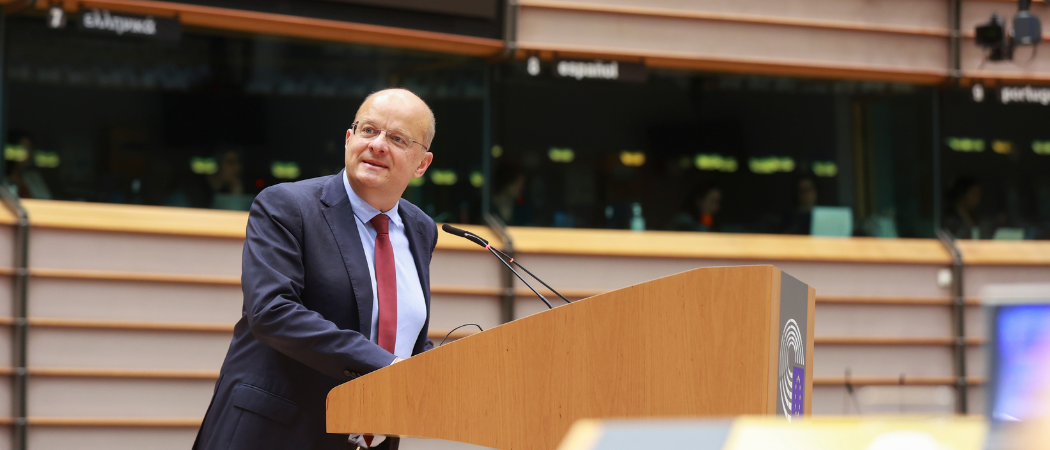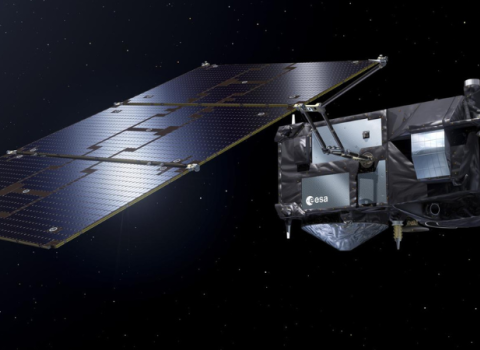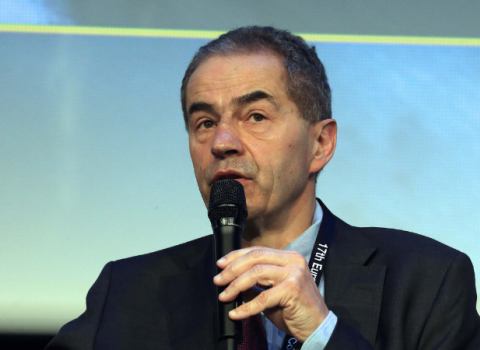European lawmakers tell Commission that the next EU Space Programme needs to be independent and better funded to protect the bloc’s strategic autonomy in space

MEP Christophe Grudler. Photo credits: Alain Rolland / European Union
The EU needs a standalone European Space Programme with a “clearly ring-fenced budget of at least €60 billion” in the next long-term budget, according to the European Parliament’s Industry, Research, and Energy Committee.
The demand comes in a letter from the committee’s coordinators, which was sent to Commission president Ursula von der Leyen on June 6.
The current EU Space Programme began with an allocation of around €15 billion, with an additional €5 billion added mid-term for Iris2, the EU’s planned secure satellite communications system. The MEPs want to see this budget tripled, to boost the EU’s competitiveness and autonomy in space, a domain they consider critical for Europe’s future.
According to Christophe Grudler, the Renew Europe MEP who initiated the letter and co-chairs the Sky and Space Intergroup in Parliament, several developments justify this increase. The war in Ukraine is a key example, he said, arguing that without drones and observation satellites the warfare would look entirely different.
The letter also warns against merging the European Space Programme with the European Competitiveness Fund, saying that this would not reflect the specific needs of the space sector. “That would go against everything that has made Europe’s space policy a success,” the MEPs write, calling it a “source of deep concern.”
“Today we’re talking about the Competitiveness Fund, and the main idea is to pool all funding into one structure,” Grudler told Science|Business. Such a framework simply doesn’t work for space, he said, as the criteria differ entirely from those of other sectors. “That’s why we need a dedicated programme with an appropriate budget.”
Finnish Green MEP Ville Niinistö echoed the call. “Unlike traditional industrial sectors, space is inherently dual-use, underpinning both civilian and defence capabilities,” he told Science|Business. He warned that treating space policy as just a part of a broader competitiveness agenda would seriously undermine its strategic importance in areas such as security, communications, intelligence and crisis response.
Niinistö also pointed out that a standalone EU Space Programme is a treaty obligation. “This is one of the rare instances where the EU’s founding treaties not only set a policy objective but also suggest the institutional mechanism, a dedicated programme, to achieve it,” he said.
Space autonomy
The MEPs argue that ensuring the EU’s competitiveness and strategic autonomy in space is not only vital for the bloc’s economy, but also essential for establishing equal partnerships with third countries. According to Grudler and Niinistö, these partnerships should be built on mutual respect between equals.
“An EU without independent launch systems or without enough capacity to launch its space-based systems is a Europe that has no space access. And a Europe with no space access is economically weaker, vulnerable and lacks the tools to be strategically autonomous,” Niinistö said.
Grudler added that without sufficient investment, the EU risks becoming fully dependent on others. “We need to take our destiny into our own hands” and be respected as partners, he said. “Then we can build partnerships, with the US or other countries. That’s not a problem. But first, we must stop relying on non-EU data and non-EU systems.”
Related articles
- ESA flags need for more investment in space
- Europe seeks leading role in burgeoning space economy
- EU will focus funds on strategic technologies to boost competitiveness
A standalone space programme is also crucial if Europe wants to set rules on who can build its space systems. For instance, projects on secure connectivity may need to exclude non-European companies since their involvement could compromise confidential communications between EU member states.
Combining space funding with other programmes would mean mixing regulations and eligibility criteria, which in turn could undermine EU security and effectiveness. “We are, of course, in favour of simplification, but not when it endangers our specific programme,” Grudler said.
Sending a signal
The MEPs are hoping to replicate the success of their campaign on the next EU research Framework Programme, FP10, which von der Leyen recently confirmed will remain a standalone programme in the next Multiannual Financial Framework (MFF). Previous speculation had raised concerns it might be merged under the Competitiveness Fund.
Grudler told Science|Business that the letter was intended to send a signal to von der Leyen, both that the Parliament would back a proposal for an independent space programme, and that the alternative would not find favour. “It is maybe an early warning, saying ‘be careful,’” Grudler said.
The MEPs’ letter was endorsed by the ASD-Eurospace industry association, which issued its own position paper calling for a ring-fenced, predictable EU budget of €40–60 billion for space. This is “critical to safeguard the continuity of Europe’s flagship programmes (Galileo, Copernicus, IRIS², SST) and ensure the continent’s strategic autonomy,” it said.
The European Commission will publish the next MFF proposal on July 16.





 A unique international forum for public research organisations and companies to connect their external engagement with strategic interests around their R&D system.
A unique international forum for public research organisations and companies to connect their external engagement with strategic interests around their R&D system.